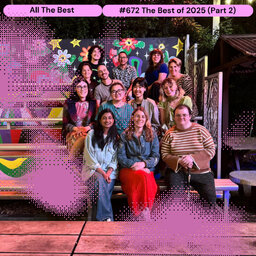Palestine: Resistance
Please listen to this week's episode with care as it includes accounts of displacement and detention in Palestine.
Last week, we heard about Amal's everyday life growing up in Aida Refugee Camp, in the West Bank Palestine. We heard stories of regular young people, living between wars, with hopes for the future.
Amal no longer lives in the camp, so this week she tells us about yearning to return to her homeland. She shares what it’s like to visit and how she holds onto connection to her family’s land.
Amal also tells us about her brother, Anas, a community leader and young father who was taken into Administrative detention late last year. That‘s Israel’s term for being arbitrarily imprisoned.
The person is taken to military court, with a military judge. There is no fair trial, no charge, no disclosure of evidence and no assurance of the actual length of their sentence. Anas is one of around 3 thousand 5 hundred administrative detainees in Israeli Occupation Prisons. These include children. As of February 24, they have detained over 6,500 Palestinian residents of the West Bank and Jerusalem.
So Amal doesn’t know when she’ll see her brother again.
Throughout Amal’s contemporary reflections are stories from Radio Lajee made in the mid 2000s, all about strength in knowing your land and where you come from.
The stories you will hear include:
My Nakba by Amaja El-Ozzo, Layan Al-Azza & Pernille Sørensen where you’ll hear grandchildren interview their grandparents, about memories of this violent land and property seizure by Zionist militias in 1948 that displaced and dispossessed over 700,000 Palestinians.
Why I read Ghassan Kanafani by Athal Al Azza. This story is about a Palestinian author and politician who inspires young people to feel pride in being Palestinian today. He was assassinated by car bomb in Beirut, Lebanon, by Israeli special intelligence on 8 July 1972.
On Gaza, while this story isn’t about Gaza today, it sounds to us like it could be. In this radio story from 2009, you’ll hear the reactions of young people from Aida camp, to what is known as Operation Cast Lead – a 22 day military assault on the Gaza Strip that began on 27 December 2008. It was the first time Israel used white phosphorus, and their actions resulted in 1400 deaths, many of them children. In a now familiar story, a UN fact-finding mission sent in the aftermath found numerous breaches of international human rights and humanitarian law.
Special thanks to Amal Abu Srour and Daz Chandler. You can listen to more stories from Radio Lajee at www.radiolajee.com.
Further Resources:
- APAN: https://apan.org.au/resources/
- PARA: https://para.org.au/give-support/
- Calls To Action Palestine Toolkit: https://palestinetoolkit.org/
- ADDAMEER: https://addameer.org/
All The Best Credits
Executive Producer: Phoebe Adler-Ryan
Editorial Producer: Melanie Bakewell
Host: Madhuraa Prakash
Mixed by Emma Higgins
Image Credit: Daz Chandler at Aida Refugee Camp
 All The Best
All The Best


